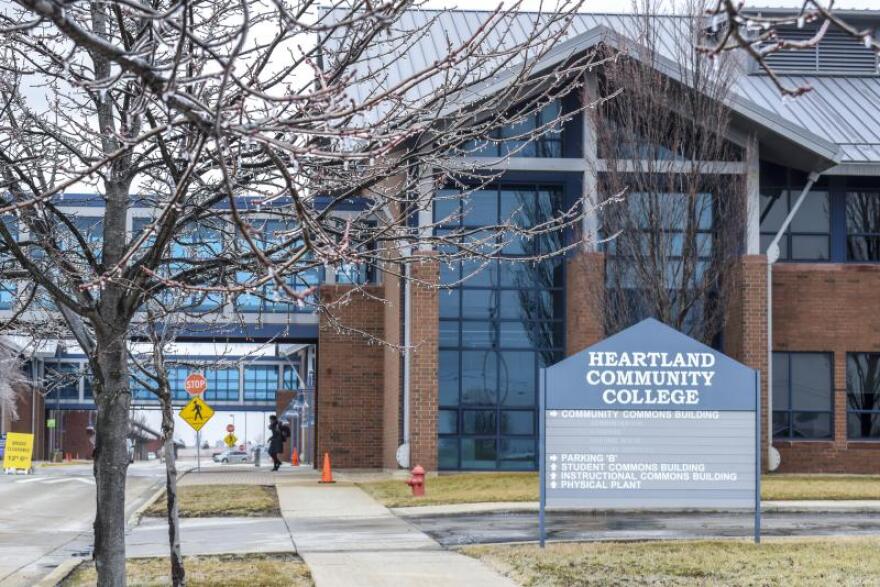Country Financial is partnering with the Heartland Community College Foundation to help underrepresented high school students jump start their college careers.
A new scholarship opportunity, called the Country Financial Scholars Program, will cover up to 18 credit hours of dual enrollment and dual credit classes a year for a dozen Bloomington-Normal area students interested in science, technology, engineering and mathematics (STEM) fields, business or agriculture. Country Financial also will connect students with mentors in those areas.
Sarah Diel-Hunt, Heartland’s vice president of enrollment and student services, said the program is focused on students who traditionally haven’t been able to afford early college access.
Heartland offers free dual credit opportunities taught by teachers in area high schools, Diel-Hunt said. But other courses, where students take courses on the college’s campus or online, have a tuition cost associated with them—along with books and fees.
“It's a great supplement for students who may want to take classes that aren't available in their high schools and who want to advance more--even all the way to the completion of an associate's degree,” Diel-Hunt said.
“What we were noticing with that is an equity issue. The students taking those credits are the ones that can afford to pay cash for them, because high school students who haven't graduated yet are not eligible for federal financial aid … So we had a real haves and have-nots situation occurring.”
Alauna McGee, director of early college opportunities, said programs like Heartland’s College NOW and Degree NOW improve students’ chances of successfully completing a college degree by reducing the cost, speeding the time to completion, aligning curriculum with college and workplace expectations, and making the transition from high school to college easier.
“We often find that there's quite a significant gap in between secondary education and post-secondary education or higher education,” McGee said. “We wholeheartedly believe that early exposure and early access gives us, parents, and students an opportunity to really add in some preventative measures, if necessary, for remediation—as well as to help other students who may not need those measures excel even further and faster.”
These programs also create more opportunities to improve degree attainment for underserved student populations, McGee said. That’s the focus of COUNTRY Financial Scholars Program.
“As we talk about STEM, business, and agriculture, we noticed a population of students are particularly underrepresented,” McGee said. “They're first-generation students, students of color, and females traditionally underrepresented in that field. It is incumbent upon us, as well as other entities in the community, to kind of redress those issues as it relates to equity.”
McGee said the College NOW program typically has between 2,000 and 2,500 applicants each year. Currently, there are about 1,500 students participating in dual credit opportunities across 17 high schools and three career centers, she said.
But outreach to students and parents has been more difficult during the COVID-19 pandemic. Diel-Hunt said encouraging students to apply for and take dual credit courses is usually an extensive face-to-face communication process with their school counselors. Now, all of that has to be done through Zoom meetings and emails.
Diel-Hunt said some students could be slipping through the cracks.
“One of our biggest concerns is: who is that denying access to and widening that gap for?” Diel-Hunt said. “How well are we reaching traditionally underrepresented populations? COVID has certainly exacerbated that problem. We as a college continue to be committed to trying to combat that in every way we can.”
Diel-Hunt said offering these opportunities at no cost doesn’t just benefit the students, it benefits Bloomington-Normal area employers like CountryFinancial. She said a lot of Heartland’s students stay in the community after they graduate. This creates a workforce pipeline.
In order to qualify, students must be sophomores or juniors in high school with a 3.0 GPA on a 4.0 scale. They must demonstrate financial need, marked by eligibility for free or reduced lunch. They also must be a first-generation student, racial or ethnic minority student, or a female interested in STEM, business,or agriculture.
Up to 12 students from Unit 5, Bloomington High School or University High will be selected for the program. Scholarship recipients will receive continued funding for their junior and senior years, provided they maintain at least a 2.5 GPA in college courses.
There's no subscription fee to listen or read our stories. Everyone can access this essential public service thanks to community support. Donate now, and help fund your public media.



